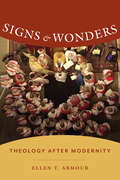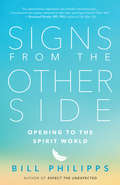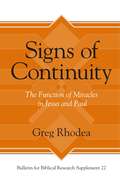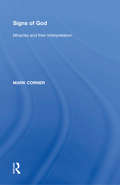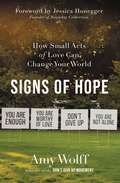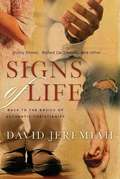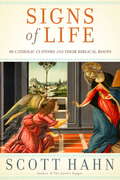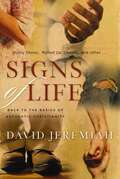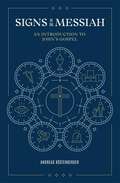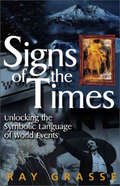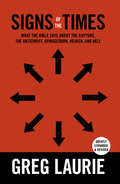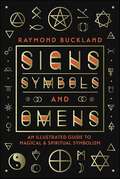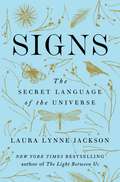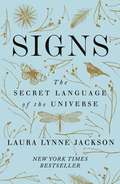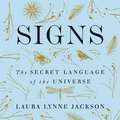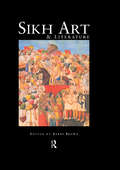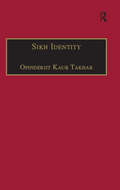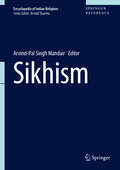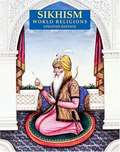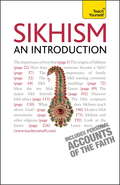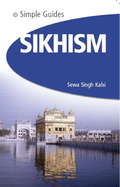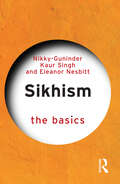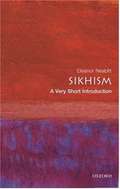- Table View
- List View
Signs and Wonders: Theology After Modernity (Gender, Theory, and Religion)
by Ellen ArmourWe are told modernity's end will destabilize familiar ways of knowing, doing, and being, but are these changes we should dread—or celebrate? Four significant events (and the iconic images that represent them) catalyze this question: the consecration of openly gay Episcopalian bishop Gene Robinson, the mistreatment of prisoners at Abu Ghraib prison, the politicization of the death of Terri Schiavo, and the disastrous response to Hurricane Katrina. Framed by an original appropriation of Michel Foucault, and drawing on resources in visual culture theory and the history of photography, Ellen T. Armour explores the anxieties, passions, and power dynamics bound up in the photographic representation and public reception of these events. Together, these phenomena expose modernity's benevolent and malevolent disruptions and reveal the systemic fractures and fissures that herald its end, for better and for worse. In response to these signs and wonders, Armour lays the groundwork for a theology and philosophy of life better suited to our (post)modern moment: one that owns up to the vulnerabilities that modernity sought to disavow and better enables us to navigate the ethical issues we now confront.
Signs from the Other Side: Opening to the Spirit World
by Bill PhilippsLOVE NEVER DIES Finding comfort through communication With stories and insightful suggestions, beloved psychic medium Bill Philipps demonstrates that our loved ones on the other side are available to us. He promises that, with an open heart and mind ready to receive, anyone can recognize the signs that spirits of the departed may be trying to send. Signs from the Other Side offers an in-depth explanation of how Bill does what he does, as well as practical advice on how to receive and interpret signs when they appear. By tapping into our intuition, we can experience deep connections that lead to forgiveness, reassurance, or simply one last moment with a loved one. The book also includes more than twenty inspiring examples of how others experienced comfort through such communications.
Signs of Continuity: The Function of Miracles in Jesus and Paul (Bulletin for Biblical Research Supplement #22)
by Greg RhodeaFor more than a century, scholars have debated whether Paul the apostle was a faithful follower of Jesus or a corruptor of Jesus’s message and the true founder of Christianity. Signs of Continuity intervenes in this debate by exploring a largely overlooked element of similarity between the two men: the place of miracles in their ministries.In his close analysis of the miracles performed by Jesus and Paul, Greg Rhodea points to signs of continuity between these two historical figures of Christianity. He argues that both Jesus and Paul understood their miracles as accompanying and actualizing a message of gracious inclusion of the marginalized, resisted proving their ability to work miracles to those who asked for a sign despite the importance of miracle-working to their personal authentication, and interpreted miracles as proof of the presence of the eschatological kingdom. Based on these similarities, Rhodea concludes that Paul the apostle knew of Jesus’s miracles and that he imitated Jesus in his own ministry of miracle-working.In highlighting this previously unexplored area of continuity, Rhodea makes a significant contribution to the debate over the relationship between Jesus and Paul. Biblical scholars and students interested in this debate will find Signs of Continuity enlightening and informative.
Signs of Continuity: The Function of Miracles in Jesus and Paul (Bulletin for Biblical Research Supplement)
by Greg RhodeaFor more than a century, scholars have debated whether Paul the apostle was a faithful follower of Jesus or a corruptor of Jesus’s message and the true founder of Christianity. Signs of Continuity intervenes in this debate by exploring a largely overlooked element of similarity between the two men: the place of miracles in their ministries.In his close analysis of the miracles performed by Jesus and Paul, Greg Rhodea points to signs of continuity between these two historical figures of Christianity. He argues that both Jesus and Paul understood their miracles as accompanying and actualizing a message of gracious inclusion of the marginalized, resisted proving their ability to work miracles to those who asked for a sign despite the importance of miracle-working to their personal authentication, and interpreted miracles as proof of the presence of the eschatological kingdom. Based on these similarities, Rhodea concludes that Paul the apostle knew of Jesus’s miracles and that he imitated Jesus in his own ministry of miracle-working.In highlighting this previously unexplored area of continuity, Rhodea makes a significant contribution to the debate over the relationship between Jesus and Paul. Biblical scholars and students interested in this debate will find Signs of Continuity enlightening and informative.
Signs of God: Miracles and their Interpretation
by Mark CornerSigns of God reveals why discussion of the nature of miracles is of central rather than marginal importance where belief in God is concerned. Miracles cannot be shunted to one side as an embarrassing hangover from a 'pre-scientific age'. Miracles have played an important role in the history of all the major world religions, and many religious believers claim that they continue to do so. Yet they have also been criticized from a philosophical viewpoint as incompatible with a belief in laws of nature, and those who seek to have their religious beliefs properly attuned to the modern world often prefer to do without them. This accessible book examines the nature of miracles both in philosophical and historical terms, and concludes that, whether or not miracles happen, it is difficult to see how religious belief could survive without them.
Signs of Hope: How Small Acts of Love Can Change Your World
by Amy WolffChanging the world--or at least your corner of it--is easier than you think.With so much suffering in our communities and in the world, it can feel impossible to make an impact. "What good can I possibly do?" we ask. Amy Wolff, a busy mom and small business owner, often felt this way--and didn't feel qualified to connect and uplift others. But one day, after hearing about several suicides and suicide attempts in her community, she printed 20 yard signs with hopeful messages and anonymously placed them throughout her city. This small action sparked a global movement of encouragement, hope, and love, which spread to 50 states and 27 countries in just 18 months. Signs of Hope is an intimate collection of stories from Amy's personal life, as well as people impacted by the movement, about the power of hope and love in the midst of suffering. This book discusses:The drain of compassion fatigueWhy we should show up imperfectly to help othersHow to claim hope for ourselvesPractical ideas of how to respond to sufferingStrategies of how to love people who are "different"Resilience when love-spreading efforts backfireHow to raise a compassionate generationThe science of hopeSigns of Hope is your catalyst for doing something today . . . because there's no perfect time to help others. The time is now.
Signs of Life
by David JeremiahDiscover personal transformation that changes the world. Just as there are physical signs that determine the overall health and wellness of a patient, so too there are signs of life determining the extent to which a man or woman has been transformed into the image of Jesus. It's a smile, a simple lifestyle, compassion in the face of misfortune, willingness to commit random acts of kindness, benevolence, social justice, tears, words. In Signs of Life bestselling author David Jeremiah leads readers through a forty-day journey to a fuller understanding of what these signs are and how to be a person marked by them. This journey pursues a life characterized by relevancy, surrender, authenticity, generosity, and compassion--and in so doing, transforms individuals, communities, and nations. Whether new to the Christian faith or considered an old-timer, readers will discover what being transformed personally into the image of Jesus means and be equipped with a greater vision for the life they are freed to live.
Signs of Life: 40 Catholic Customs and Their Biblical Roots
by Scott HahnScott Hahn, the bestselling author of The Lamb's Supper and Reasons to Believe, celebrates the touchstones of the Catholic life, guiding readers to a deeper faith through the Church's rites, customs, and traditional prayers. Signs of Life is beloved author Scott Hahn's clear and comprehensive guide to the Biblical doctrines and historical traditions that underlie Catholic beliefs and practices. Devoting single chapters to each topic, the author takes the reader on a journey that illuminates the roots and significance of all things Catholic, including: the Sign of the Cross, the Mass, the Sacraments, praying with the saints, guardian angels, sacred images and relics, the celebration of Easter, Christmas, and other holidays, daily prayers, and much more. In the appealing conversational tone that has won him millions of devoted readers, Hahn presents the basic tenets of Church teachings, clears up common misconceptions about specific rituals and traditions, and responds thoughtfully to the objections raised about them. Each chapter concludes with loving, good-natured, inspiring advice on applying the Church's wisdom to everyday life.From the Hardcover edition.
Signs of Life: Back to the Basics of Authentic Christianity
by David JeremiahDiscover personal transformation that changes the world. Just as there are physical signs that determine the overall health and wellness of a patient, so too there are signs of life determining the extent to which a man or woman has been transformed into the image of Jesus. It's a smile, a simple lifestyle, compassion in the face of misfortune, willingness to commit random acts of kindness, benevolence, social justice, tears, words. In Signs of Life bestselling author David Jeremiah leads readers through a forty-day journey to a fuller understanding of what these signs are and how to be a person marked by them. This journey pursues a life characterized by relevancy, surrender, authenticity, generosity, and compassion-and in so doing, transforms individuals, communities, and nations. Whether new to the Christian faith or considered an old-timer, readers will discover what being transformed personally into the image of Jesus means and be equipped with a greater vision for the life they are freed to live.
Signs of the Messiah: An Introduction to John's Gospel
by Andreas KöstenbergerThat you may believe Have you ever asked God for a sign? Throughout Scripture, God gave signs to his people, whether mighty acts during the exodus or miracles through Elijah and Elisha. Jesus was also asked for a sign. Yet despite giving seven remarkable signs, his people refused to believe him. In Signs of the Messiah, Andreas Köstenberger--veteran New Testament scholar and expert on the Gospel of John--guides readers through John and highlights its plot and message. John's Gospel is written to inspire faith in Jesus. By keeping the Gospel's big picture in view, readers will see Jesus' mighty signs and be compelled to trust more fully in the Messiah. Readers will have a deeper grasp of John's message and intent through this short and accessible introduction.
Signs of the Times: Unlocking the Symbolic Language of World Events
by Ray Grasse“A unique and extremely interesting examination of both history and the unfolding present as seen through the prism of astrological significance.” —John Anthony West, author of Serpent in the SkyWe may live in astonishing times, but they are not incomprehensible when you know how to read the signs.Everybody says we’re entering the Age of Aquarius, but when does it start, and how will we know what it looks and feels like? Ray Grasse deciphers the signs and correspondences of our nearing Aquarian future, using the tools of astrology, synchronicity, and mythology. He draws richly from contemporary religion, art, politics, science, even current movies, to show how the cultural signs of Aquarius and our likely future are already apparent and changing our world.The Aquarian Age will be marked by its intensely mental quality, when information will be the driving force of society and the biggest challenges we face will be those of the mind. Decentralization will be the order of business, either the empowered individual will reign supreme, or the collective interests of globalized society will predominate. It could be both.We are all participants in the global drama and all aspects of our inner and outer lives are bound up with the new Aquarian themes. Signs of the Times is the authoritative travel guide for the trip into our future—don’t leave the present without it.“An attempt, firmly anchored in the age-old tradition of spiritual symbology, to make sense of what often strikes us as utterly chaotic, arbitrary, and senseless.” —Georg Feuerstein, PhD, author of The Yoga Tradition
Signs of the Times: What the Bible Says About the Rapture, Anti-Christ, Armageddon, Heaven and Hell
by Greg LaurieFEATURES AND BENEFITSReveals what&’s next for the nation, the planet, and the body of ChristExposes what is taking place in the invisible spiritual worldPoints to a God who is in complete controlThe signs are unmistakable. We've always had earthquakes but this many? We've always faced natural disasters but this terrible? We've always had Middle East tensions but this intense? This widespread? Jesus said there would be clear signs in our world before His return. Over the last few months and years, as we read headline after amazing headline, those signs seem to be escalating. Could Christ's return and our world's final days be very far away? Greg Laurie opens the Scriptures, offering insight, warning, and encouragement to "make the most of every opportunity" in these challenging days.
Signs, Symbols & Omens: An Illustrated Guide to Magical & Spiritual Symbolism
by Raymond BucklandAs human beings, we live in a world of symbols. From traffic signs to the very letters that comprise these words, symbols are woven into every aspect of daily life. Since prehistoric times humans have used symbolic representation to communicate with each other and with the divine.In Signs, Symbols & Omens, leading occult authority Ray Buckland describes the form and meaning of over 800 symbols from ancient and modern religions, magical traditions, and indigenous cultures around the world:AlchemyAncient EgyptAstrologyAustralian AboriginesAztec and MayanBuddhistCelticCeremonial MagicChineseChristianFreemasonryGnosticGreek and RomanHinduIslamicJudaicMagical AlphabetsNative AmericanNorseRosicrucianRunicShintoSikhTravelersVoudounWitchcraftOmensUnderstand the symbols used throughout human history and gain a deeper appreciation for the depth of the human experience and the vast uncharted realm of the collective unconscious.
Signs: The Secret Language of the Universe
by Laura JacksonLaura Lynne Jackson is a psychic medium and the author of the New York Times bestseller The Light Between Us. She possesses an incredible gift: the ability to communicate with loved ones who have passed, convey messages of love and healing, and impart a greater understanding of our interconnectedness. Though her abilities are exceptional, they are not unique, and that is the message at the core of this book. Understanding “the secret language of the universe” is a gift available to all. As we learn to ask for and recognize signs from the other side, we will start to find meaning where before there was only confusion, and see light in the darkness. We may decide to change paths, push toward love, pursue joy, and engage with life in a whole new way. In Signs, Jackson is able to bring the mystical into the everyday. She relates stories of people who have experienced uncanny revelations and instances of unexplained synchronicity, as well as others drawn from her own experience. There’s the lost child who appears to his mother as a deer that approaches her unhesitatingly at a highway rest stop; the name written on a dollar bill that lets a terrified wife know that her husband will be okay; the Elvis Presley song that arrives at the exact moment of Jackson’s own father’s passing; and many others. This is a book that is inspiring and practical, deeply comforting and wonderfully motivational, in asking us to see beyond ourselves to a more magnificent universal design.
Signs: The secret language of the universe
by Laura Lynne JacksonA modern guide to connecting with the other side, Signs is full of stories of hope. It teaches us how to recognise and interpret the life-changing messages from loved ones and spirit guides, by a renowned psychic medium.Laura Lynne Jackson is a psychic medium and the author of the New York Times bestseller The Light Between Us. She possesses an incredible gift: the ability to communicate with loved ones who have passed, convey messages of love and healing, and impart a greater understanding of our interconnectedness. Though her abilities are exceptional, they are not unique, and that is the message at the core of this book. Understanding 'the secret language of the universe' is a gift available to all. As we learn to ask for and recognise signs from the other side, we will start to find meaning where before there was only confusion, and see light in the darkness. We may decide to change paths, push toward love, pursue joy, and engage with life in a whole new way.In Signs, Jackson is able to bring the mystical into the everyday. She relates stories of people who have experienced uncanny revelations and instances of unexplained synchronicity, as well as others drawn from her own experience. There's the lost child who appears to her mother as a deer that approaches her unhesitatingly at a highway rest stop; the name written on a dollar bill that lets a terrified wife know that her husband will be okay; the Elvis Presley song that arrives at the exact moment of Jackson's own father's passing; and many others. This is a book that is inspiring and practical, deeply comforting and wonderfully motivational, in asking us to see beyond ourselves to a more magnificent universal design.
Signs: The secret language of the universe
by Laura Lynne JacksonA modern guide to connecting with the other side, Signs is full of stories of hope. It teaches us how to recognise and interpret the life-changing messages from loved ones and spirit guides, by a renowned psychic medium.Laura Lynne Jackson is a psychic medium and the author of the New York Times bestseller The Light Between Us. She possesses an incredible gift: the ability to communicate with loved ones who have passed, convey messages of love and healing, and impart a greater understanding of our interconnectedness. Though her abilities are exceptional, they are not unique, and that is the message at the core of this book. Understanding 'the secret language of the universe' is a gift available to all. As we learn to ask for and recognise signs from the other side, we will start to find meaning where before there was only confusion, and see light in the darkness. We may decide to change paths, push toward love, pursue joy, and engage with life in a whole new way.In Signs, Jackson is able to bring the mystical into the everyday. She relates stories of people who have experienced uncanny revelations and instances of unexplained synchronicity, as well as others drawn from her own experience. There's the lost child who appears to her mother as a deer that approaches her unhesitatingly at a highway rest stop; the name written on a dollar bill that lets a terrified wife know that her husband will be okay; the Elvis Presley song that arrives at the exact moment of Jackson's own father's passing; and many others. This is a book that is inspiring and practical, deeply comforting and wonderfully motivational, in asking us to see beyond ourselves to a more magnificent universal design.
Sikh Art and Literature
by Kerry BrownSikh Art and Literature traverses the 500-year history of a religion that dawned with the modern age in a land that was a thoroughfare of invading armies, ideas and religions and arts of the East and West. Essays by art curators, historians and collectors and religion and literary scholars are illustrated with some of the earliest and finest Sikh paintings. Sikh modernism and mysticism is explored in essays on the holy Guru Granth Sahib; the translations and writings of the British Raj convert, M.A. Macauliffe; the fathers of modern Punjabi literature, Bhai Vir Singh and Puran Singh; and the 20th century fiction writers Bhai Mohan Vaid Singh and Khushwant Singh. Excerpts from journals of visitors to the court of the diminutive and new translations of early twentieth century poetry add depth and originality to this beautiful and accessible introduction to the art, literature, beliefs and history of the Sikhs.Illustrated throughout with 42 colour and 92 black and white images, Sikh Art and Literature is a colourful, heartfelt, and informative introduction to the Sikh culture.
Sikh Identity: An Exploration of Groups Among Sikhs
by Opinderjit Kaur TakharIt is commonly assumed that all Sikhs are the same, but the very existence of different groups who have varying beliefs and practices within the Sikh community shows that a corporate identity for the Sikh community is not possible and serves to alienate a substantial proportion of Sikhs from the overall fold of the Sikh faith. Introducing the beliefs and practices of a range of individual Sikh groups, this book addresses the issue of Sikh identity across the Sikh community as a whole but from the viewpoint of different types of Sikh. Examining the historical development of Sikhism from the period of Guru Nanak to the present day, the author takes an in-depth look at five groups in the Sikh community - the Guru Nanak Nishkam Sewak Jatha; the Namdharis; the Ravidasis; the Valmikis; and the Sikh Dharma of the Western hemisphere (associated with the Healthy, Happy, Holy Organization - 3HO). Their history, beliefs and practices are explored, as well as their diverse and shared identities. Concluding that there is no authoritative yardstick with which to assess the issue of Sikh identity, the author highlights Sikhism's links to its Hindu past and suggests a federal Sikh identity with one or two fundamental beliefs at the core and individual groups left to express their own unique beliefs and practices.
Sikhism
by Arvind-Pal Singh MandairSikhism's short but relatively eventful history provides a fascinating insight into the working of misunderstood and seemingly contradictory themes such as politics and religion, violence and mysticism, culture and spirituality, orality and textuality, public sphere versus private sphere, tradition and modernity. This book presents students with a careful analysis of these complex themes as they have manifested themselves in the historical evolution of the Sikh traditions and the encounter of Sikhs with modernity and the West, in the philosophical teachings of its founders and their interpretation by Sikh exegetes, and in Sikh ethical and intellectual responses to contemporary issues in an increasingly secular and pluralistic world. "Sikhism: A Guide for the Perplexed" serves as an ideal guide to Sikhism, and also for students of Asian studies, Sociology of Religion and World Religions.
Sikhism
by Nikky-Guninder Kaur SinghSikhism describes the basic tenets of Sikhism and tells the engaging story of its growth in India and beyond. It also examines the recent move toward greater political independence within the Indian nation, the effects of Hindu nationalism on the Sikh community, and issues of cultural adaptation, persecution, and subsequent education now taking place in the West.
Sikhism - An Introduction: Teach Yourself
by Owen ColeThis book is a comprehensive introduction to the Sikh faith. Ideal for those with little knowledge of the religion, it will give you a clear understanding of what Sikh's believe, and how they practise their faith. Covering all aspects, from the history of Sikhism, to Sikh ethics, to the practicalities of living a Sikh life, learn what it means to be Sikh today.NOT GOT MUCH TIME?One, five and ten-minute introductions to key principles to get you started.AUTHOR INSIGHTSLots of instant help with common problems and quick tips for success, based on the author's many years of experience.TEST YOURSELFTests in the book and online to keep track of your progress.EXTEND YOUR KNOWLEDGEExtra online articles at www.teachyourself.com to give you a richer understanding of psychology.FIVE THINGS TO REMEMBERQuick refreshers to help you remember the key facts.TRY THISInnovative exercises illustrate what you've learnt and how to use it.
Sikhism - An Introduction: Teach Yourself
by Owen ColeThis book is a comprehensive introduction to the Sikh faith. Ideal for those with little knowledge of the religion, it will give you a clear understanding of what Sikh's believe, and how they practise their faith. Covering all aspects, from the history of Sikhism, to Sikh ethics, to the practicalities of living a Sikh life, learn what it means to be Sikh today.NOT GOT MUCH TIME?One, five and ten-minute introductions to key principles to get you started.AUTHOR INSIGHTSLots of instant help with common problems and quick tips for success, based on the author's many years of experience.TEST YOURSELFTests in the book and online to keep track of your progress.EXTEND YOUR KNOWLEDGEExtra online articles at www.teachyourself.com to give you a richer understanding of psychology.FIVE THINGS TO REMEMBERQuick refreshers to help you remember the key facts.TRY THISInnovative exercises illustrate what you've learnt and how to use it.
Sikhism - Simple Guides
by Sewa Singh KalsiTHIS BOOK WILL HELP YOU* to appreciate one of the historic religions of the Indian subcontinent* to understand what it means to be a Sikh, especially the guru--disciple relationship* to recognize the key festivals of the Sikh year and the different aspects of Sikh worship and practice* to avoid faux pas in conversation, in travelling and in personal relationshipsACCESS THE WORLD'S RELIGIONSSimple Guides: Religions is a series of concise, accessible introductions to the world's major religions. Written by experts in the field, they offer an engaging and sympathetic description of the key concepts, beliefs and practices of different faiths.Ideal for spiritual seekers and travellers alike, Simple Guides aims to open the doors of perception. Together the books provide a reliable compass to the world's great spiritual traditions, and a point of reference for further exploration and discovery. By offering essential insights into the core values, customs and beliefs of differentsocieties, they also enable visitors to be aware of the cultural sensibilities of their hosts, and to behave in a way that fosters mutual respect and understanding.
Sikhism - The Basics (The Basics)
by Eleanor Nesbitt Nikky-Guninder Kaur SinghSikhism: The Basics provides an accessible, up-to-date and gender inclusive introduction to one of the five major world religions. The chronological and geographical parameters of the book are expansive, tracing five and half centuries ‒ from the vision of the founder Guru (Nanak 1469-1539) to its rich diasporic presence across the globe. Sikhism: The Basics includes chapters on: the ten Sikh Gurus; a historical overview from the post-Guru period to modern times (contextualised by the history of Sikhs’ spiritual capital, Amritsar) theological imaginary, practices the Sikh diaspora (Sikhs’ history in North America, Asia (from west Asia to south-east Asia and China, Australasia, the UK and mainland Europe) Sikh art and literature; contemporary challenges and future prospects. Written by two authors approaching Sikhism from 'insider' (Nikky-Guninder Kaur Singh) and 'outsider” (Eleanor Nesbitt) perspectives. Accessible to the general reader, it also offers a fresh approach for students and scholars in the study of religions, Sikh Studies, Asian Religions, Anthropology and Diaspora Studies, South Asia, and history.
Sikhism: A Very Short Introduction
by Eleanor Nesbitt"This Very Short Introduction will introduce newcomers to the meaning of Sikhism, its teachings, practices, rituals and festivals. Highlighting the key threads in the history of Sikhism, from the early Gurus to martyrdom, militarization, and the diaspora, Eleanor Nesbitt brings the subject completely up to date with an examination of gender, caste, and contemporary Sikh identity." --BOOK JACKET.
